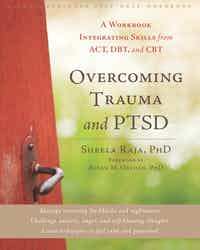A Letter from Sheela Raja, PhD
Traumatic events like accidents, domestic violence, combat, natural disasters, and sexual assault can have a huge impact on people’s lives. They shake our belief systems to the core and influence our ability to connect with others. As a clinician and a researcher, I have been amazed by our ability to survive and thrive after trauma when given the right set of tools and support.
 Overcoming Trauma and PTSD reflects the recent innovations and evolution in psychotherapy techniques. Drawing on the tradition of cognitive behavioral therapy (CBT) techniques, acceptance and commitment therapy (ACT) and dialectical behavior therapy (DBT) have introduced concepts like acceptance and mindfulness into psychotherapy.
Overcoming Trauma and PTSD reflects the recent innovations and evolution in psychotherapy techniques. Drawing on the tradition of cognitive behavioral therapy (CBT) techniques, acceptance and commitment therapy (ACT) and dialectical behavior therapy (DBT) have introduced concepts like acceptance and mindfulness into psychotherapy.
Mindfulness is the ability to connect to the present moment and truly participate in the here and now. Acceptance is a related concept, which requires learning how to experience thoughts and emotions without judgment. Interestingly, mindfulness and acceptance are both ancient concepts found in most major religious and philosophical traditions. It’s not a coincidence that people who seem to be the most resilient after traumatic events are ones who have a sense of spirituality and a feeling of deeper meaning in their lives. When you are dealing with anxiety that is focused on past trauma, mindfulness helps people feel safe and grounded. Similarly, many trauma survivors go to great lengths to avoid painful thoughts and feelings. Acceptance gives people permission to compassionately experience their thoughts and feelings, so they can eventually rebuild their lives.
By experimenting with various CBT, DBT, and ACT techniques, readers can use this book to cope with difficult thoughts and emotions, find moments of joy in their daily lives, and develop meaningful connections to others.Overcoming Trauma and PTSD is a compassionate, accessible, and valuable resource in the journey toward healing and resilience.


 2024 Peace Playbook: 3 Tactics to Avoid Clashes with Your Partner
2024 Peace Playbook: 3 Tactics to Avoid Clashes with Your Partner